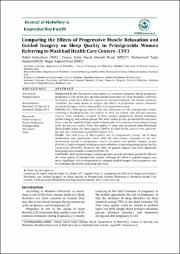| dc.contributor.author | Golmakani, Nahid | en_US |
| dc.contributor.author | Seyed Ahmadi Nejad, Farnaz Sadat | en_US |
| dc.contributor.author | Shakeri, Mohammad Taghi | en_US |
| dc.contributor.author | Asghari Pour, Negar | en_US |
| dc.date.accessioned | 1399-07-09T03:18:48Z | fa_IR |
| dc.date.accessioned | 2020-09-30T03:18:48Z | |
| dc.date.available | 1399-07-09T03:18:48Z | fa_IR |
| dc.date.available | 2020-09-30T03:18:48Z | |
| dc.date.issued | 2015-04-01 | en_US |
| dc.date.issued | 1394-01-12 | fa_IR |
| dc.date.submitted | 2015-02-09 | en_US |
| dc.date.submitted | 1393-11-20 | fa_IR |
| dc.identifier.citation | Golmakani, Nahid, Seyed Ahmadi Nejad, Farnaz Sadat, Shakeri, Mohammad Taghi, Asghari Pour, Negar. (2015). Comparing the Effects of Progressive Muscle Relaxation and Guided Imagery on sleep quality in primigravida women referring to Mashhad health care centers-1393. Journal of Midwifery and Reproductive Health, 3(2), 335-342. doi: 10.22038/jmrh.2015.3951 | en_US |
| dc.identifier.issn | 2345-4792 | |
| dc.identifier.uri | https://dx.doi.org/10.22038/jmrh.2015.3951 | |
| dc.identifier.uri | http://jmrh.mums.ac.ir/article_3951.html | |
| dc.identifier.uri | https://iranjournals.nlai.ir/handle/123456789/238051 | |
| dc.description.abstract | <em>Background & aim:</em> Decreased sleep quality is a common complaint during pregnancy. Relaxation is one of the non-pharmaceutical treatments for sleep disorders. Different techniques could have different impacts on various biological and mental stressors. Therefore, this study aimed to compare the effects of progressive muscle relaxation and guided imagery on the sleep quality of primigravida women. <br/><em>Methods:</em>This three-group clinical trial was conducted on 100 primigravida women, referring to Mashhad health care centers in 2014. All women, who met the inclusion criteria, were randomly assigned to three groups: progressive muscle relaxation, guided imagery, and control groups. The intervention groups performed the exercises twice a day for a period of four weeks at home after two sessions of relaxation training (held during two weeks). Then, the quality of sleep was measured using Pittsburgh Sleep Quality Index. For data analysis, ANOVA, Kruskal-Wallis, paired t-test, and post-hoc test were performed, using SPSS version 11.5. <br/><em>Results:</em> The total score of sleep quality and its components (except use of sleep medication) was significantly lower after the intervention, compared to the pre-intervention period in progressive muscle relaxation and guided imagery groups (P<0.001). Both relaxation techniques were effective in improving sleep quality and its components (P<0.001). However, the effect of guided imagery was more significant than progressive muscle relaxation (P=0.015). <br/><em>Conclusion:</em> Both guided imagery and progressive muscle relaxation positively affected the sleep quality of primigravida women, although the effect of guided imagery was more significant. It is recommended to integrate guided imagery into pregnancy care for primigravida women with sleep disorders. | en_US |
| dc.format.extent | 594 | |
| dc.format.mimetype | application/pdf | |
| dc.language | English | |
| dc.language.iso | en_US | |
| dc.publisher | Mashhad University of Medical Sciences | en_US |
| dc.relation.ispartof | Journal of Midwifery and Reproductive Health | en_US |
| dc.relation.isversionof | https://dx.doi.org/10.22038/jmrh.2015.3951 | |
| dc.subject | Relaxation | en_US |
| dc.subject | Muscle Relaxation | en_US |
| dc.subject | Guided imagery | en_US |
| dc.subject | Sleep | en_US |
| dc.subject | Primigravidity | en_US |
| dc.title | Comparing the Effects of Progressive Muscle Relaxation and Guided Imagery on sleep quality in primigravida women referring to Mashhad health care centers-1393 | en_US |
| dc.type | Text | en_US |
| dc.contributor.department | Assistant professor, Department of Midwifery, School of Nursing and Midwifery, Mashhad University of Medical Sciences, Mashhad, Iran | en_US |
| dc.contributor.department | MSc in Midwifery, Department of Midwifery, School of Nursing and Midwifery, Mashhad University of Medical Sciences, Mashhad, Iran | en_US |
| dc.contributor.department | Professor of Biostatistics, Department of Social Medicine , Mashhad University of Medical Sciences, Mashhad, Iran | en_US |
| dc.contributor.department | Assistant Professor, Psychiatry and Behavioral Sciences Research Center, Ebne-sina Hospital, School of Medicine, Mashhad University of Medical Sciences, Mashhad, Iran. | en_US |
| dc.citation.volume | 3 | |
| dc.citation.issue | 2 | |
| dc.citation.spage | 335 | |
| dc.citation.epage | 342 | |
| nlai.contributor.orcid | 0000-0001-7249-3977 | |





